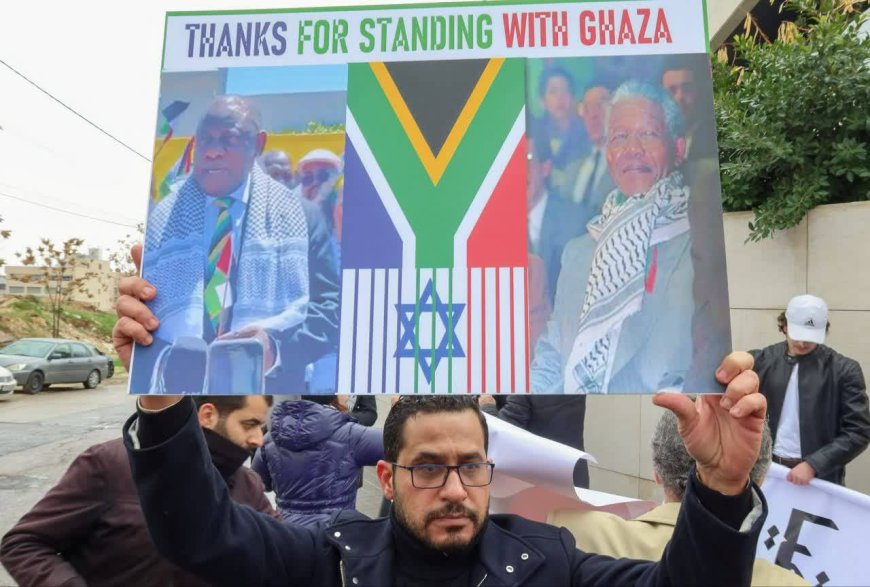Mandela's Legacy Lives On: South Africa Holds Israel Accountable for Genocide at the ICJ
For decades, the people of South Africa have extended their sincere sympathies to the Palestinian nation, drawing a powerful parallel between their own struggle against apartheid and the plight of Palestinian civilians living in the besieged Gaza Strip and the occupied. Nelson Mandela, the revered leader of South Africa and the shining symbol of the anti-apartheid movement, highlighted this connection in a landmark speech delivered in 1997. Mandela proclaimed, "We know very well that our freedom is incomplete without the freedom of the Palestinians."

South Africa, having endured the harrowing experience of the apartheid regime and pernicious racial discrimination, has emerged as a steadfast champion of justice for Palestine. With its rich history of resistance, South Africa now stands at the forefront of a valiant crusade in support of the oppressed Palestinian people, who have suffered untold atrocities under the yoke of the Israeli regime in the Gaza Strip. South Africa has recently lodged a formal complaint with the International Court of Justice (ICJ) in The Hague, accusing the Israeli regime of perpetrating acts tantamount to genocide and war crimes in Gaza. The comprehensive 84-page petition asks the ICJ court to investigate Israel's commission of genocide during the ongoing war in Gaza.
By invoking the provisions outlined in the "Convention on the Prevention and Punishment of the Crime of Genocide," to which both Israel and South Africa are signatories, South Africa asserts that the ICJ possesses the authority to serve as the legal arbiter within the United Nations framework.
In a poignant demonstration of its humanitarian commitment, South Africa has undertaken this endeavor despite its status as a non-belligerent party and geographical distance from the conflict zone. Such courageous démarches amplify the gravity of South Africa's international status, exerting an everlasting influence on global affairs and public opinion.
Today, the Zionist regime finds itself embroiled in international legal scrutiny for the first time since its inception in 1948. This unprecedented development has prompted Israel to dispatch senior legal experts to the Hague Court to confront the charges of perpetrating genocide against the Palestinian population in Gaza. It is noteworthy that Israel's decision to engage with the court rather than shun it as it has done with the United Nations and other international judicial bodies underscores the regime's apprehension that the judges may issue an injunction demanding an immediate cessation of its aggression in Gaza. Moreover, Israel fears that its international reputation will be further tarnished.
What ramifications will South Africa's complaint against the Zionist regime yield? Foremost among its demands is an injunction from the ICJ to impose a ceasefire in Gaza. While the court lacks direct enforcement capabilities and expectations of Israel non-complying with the ICJ order to halt military operations remain elusive, the implications of this legal endeavor transcend mere immediate outcomes and possess the potential to galvanize a broad international front against Israel and effectively isolate Israel on the international stage.
Furthermore, the Zionists' appearance in court on charges of genocide is poised to heighten global sensitivity towards Israel's nuclear arsenal. A regime accused of genocide by the highest judicial authority in the world cannot conceivably wield weapons of mass destruction. Simultaneously, Israel’s genocide case before the ICJ is liable to escalate the cost of supporting Israel for Western statesmen. Consequently, human rights organizations and civil society activists would certainly be encouraged to utilize the potential orders issued by the court to hold accountable those in positions of power who endorse Israel’s genocidal campaign.
In conclusion, the unequivocal resolve of South Africa in championing the cause of the oppressed Palestinian people reverberates across the globe, resonating with those who yearn for justice and freedom. As this momentous legal battle unfolds within the halls of the ICJ, the world watches with bated breath, hopeful that the pursuit of justice and accountability will prevail.













































